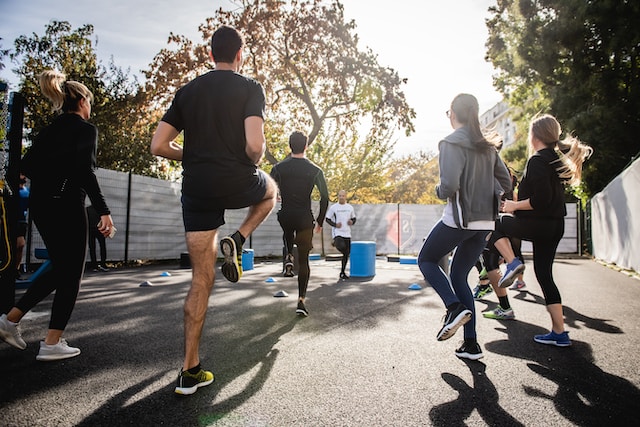Why Exercise Is Beneficial For Your Health

Physical Health Boosted
Exercise is important for maintaining a healthy body weight and preventing obesity. It strengthens the heart and promotes blood flow, which reduces the risk of heart diseases. Overweight or obesity can cause a number of health issues, such as diabetes, high blood-pressure, and joint pain. Exercise helps maintain a healthy body weight and reduces our risk of chronic diseases. Numerous studies, including those published in medical journals and online magazines such as Muscle & Health, have proven that exercise boosts our immune system and reduces the risk of illness. Exercise can also increase your lifespan and keep you healthy into old age.
Increasing Life Expectancy And Disease Prevention
Regular physical activity has been shown to extend your life span and reduce your risk of developing chronic diseases such as diabetes, osteoporosis, and certain types of cancer. Exercise can delay or prevent the onset of chronic diseases by maintaining a healthy body weight and improving blood flow. Staying active can improve bone density and reduce the risk of fractures and osteoporosis in older adults. Exercise has also been shown to improve memory and cognitive function, reducing the risk of age related memory loss. Exercise can improve our quality of life, by reducing disability risk and increasing independence as we age.
Enhancing Mental Health
Physical activity can help alleviate depression and anxiety symptoms, improving your mental health. Exercise increases the production of endorphins in the brain. These chemicals are also known as the “feel-good” chemical. They reduce stress and improve mood. Exercise is a good way to cope with negative emotions and stress. It promotes mental health and well-being. Staying active can also improve sleep, boost self-esteem, confidence and give a feeling of accomplishment.
Increased Strength And Flexibility
Exercise improves physical performance by increasing muscular strength, flexibility and endurance. Regular exercise makes our bodies more resilient, and able to cope with daily tasks. It can have a major impact on our quality of life by allowing us to live an active lifestyle with no pain or discomfort. Exercise can help older adults prevent injuries and falls by improving their balance and coordination. Exercise is essential for a strong and healthy body that allows us to lead an independent life. Flexibility is not only about being able touch your toes. It also reduces the chance of injury and muscle strains.

Strengthen Immune System
Regular moderate intensity exercise improves your body’s immune system by boosting it. Exercise increases blood flow, which helps immune cells circulate throughout the body. This allows them to fight potential illnesses. This is particularly important during flu season and when facing illnesses such as COVID-19. We can improve our immunity and reduce our risk of illness by incorporating regular exercise into our lives.
Improved Sleep Quality
Regular physical activity improves the quality and length of sleep, which contributes to your overall wellbeing. Did you know regular exercise helps regulate your body’s rhythmic cycle? You can then enjoy a better, more restful night’s sleep. Why not incorporate exercise into your daily schedule and enjoy the benefits of a better sleep schedule? It can also decrease feelings of anxiety and stress allowing you to sleep more peacefully. Exercise is a great way to achieve quality sleep. Adequate sleep helps maintain good mental and physical health. Exercise is important for good health. However, exercising too close before bed can have the opposite affect and make it difficult to fall asleep. Avoid exercising too close to your bedtime to ensure a good sleep.
Brain Health
Exercise improves cognitive function and prevents age-related declines in brain functions. It also reduces dementia risk. Exercise increases blood circulation to the brain which promotes the growth of new neuronal cells and enhances overall brain function. It can improve your memory, concentration and decision-making abilities, leading to a sharper brain and increased productivity. Incorporating exercise into your daily life can improve brain health over time and reduce cognitive decline. Just like our bodies, the brains also need to be exercised!
Exercise is essential for our overall health and well-being. Exercise is essential for our physical and mental well-being. Every little thing counts when it comes to promoting an active and healthy lifestyle. Let’s prioritize exercise to reap the benefits of a healthier lifestyle.


MOST COMMENTED
FITNESS / Health
How To Build Muscle In A Healthy Way: A Comprehensive Guide
FITNESS / Health
5 REASONS WORKOUT CLASSES FOR AGE-INCLUSIVE PEOPLE ARE GAME-CHANGERS
Health / HOME
KEEPING YOUR CLINIC UP WITH THE TIMES
HOME / Wellbeing
TIPS FOR MOVING A TINY HOME
FITNESS / Health
HOW TO FIND AN ACTIVITY YOU LOVE TO HELP YOU STAY ACTIVE
FITNESS / Health
The 3 Best Reasons To Incorporate Cannabis Into Your Fitness Routine
HOME / Wellbeing
Winter Wellbeing: Self-Care Strategies For Managing Seasonal Affective Disorder
HOME / Wellbeing
DON’T FORGET THESE ESSENTIALS THE NEXT TIME YOU HEAD OUT OF TOWN
Health / HOME / Wellbeing
UK FOREST HOLIDAYS: YOUR GUIDE TO EMBRACE NATURES PLAYGROUND
FITNESS / Health
Fitness Coaches: 3 Top Tips To Stay Motivated